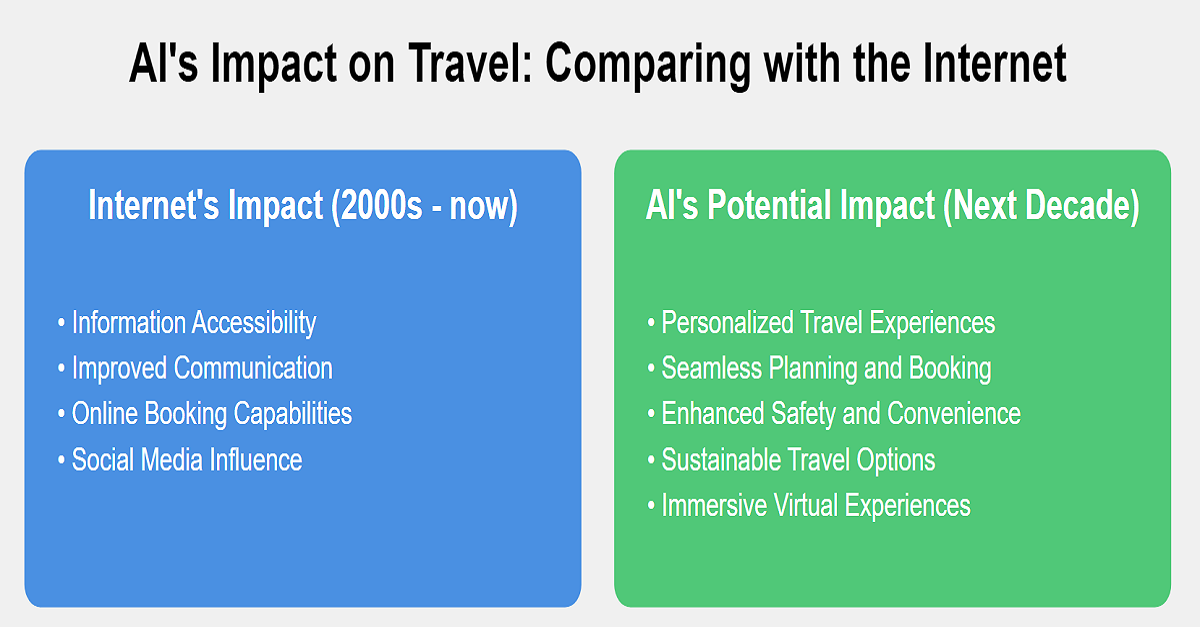AI's Impact on Your Future Travels
Comparison of Internet and AI Transformations in Travel
Artificial intelligence (AI) is set to disrupt the travel industry. Much like the internet transformed travel from the 2000s onward - AI will take these advancements even further. This post explores the internet's transformative impact on travel and presents possible scenarios for how AI could reshape travel experiences, comparing the two technological waves. AI's potential to redefine our travel experiences is immense.
How the Internet Changed Travel (2000s until now)
The internet accelerated travel by making information widely accessible and enabling self-service for travel arrangements:
Information Accessibility: Detailed information about destinations, accommodations, and attractions became readily available.
Improved Communication: Exposure to more languages and cultures through travel, facilitated by the internet, enhanced communication skills and cross-cultural understanding.
Booking Capabilities: Travelers could book flights, hotels, and tours online, often comparing prices and reviews.
Social Media Influence: Platforms like TripAdvisor and Yelp allowed for crowd-sourced reviews, influencing travel decisions.
AI's Potential Transformations in Travel (10-Year Forecast)
AI is set to transform the travel industry even further. Here are some scenarios for how AI could change travel in the next decade:
Personalized Travel Experiences
AI-Driven Itineraries: AI can create personalized travel itineraries based on individual preferences, past travel behavior, and real-time data, ensuring a highly customized travel experience.
Dynamic Adjustments: AI systems can dynamically adjust travel plans in response to real-time events such as weather changes, local events, or personal health data.
Cultural Immersion: AI-driven language translation and cultural guidance tools will allow travelers to deeply immerse themselves in local cultures without language barriers.
2. Seamless Travel Planning and Booking
AI Travel Assistants: Virtual travel assistants can handle all aspects of travel planning, from booking flights and hotels to making restaurant reservations and suggesting activities.
Automated Price Optimization: AI can continuously monitor and predict price changes, automatically rebooking travel services to get the best deals.
Integrated Platforms: Comprehensive AI platforms will integrate travel planning, booking, and management in one seamless interface, reducing the need for multiple apps and websites.
3. Enhanced Travel Safety and Convenience
Predictive Safety Alerts: AI can analyze global data to provide real-time safety alerts and travel advisories tailored to individual travelers.
Health Monitoring: AI-powered wearables can monitor travelers' health and provide recommendations or emergency assistance if needed.
Efficient Travel Processes: AI can streamline airport security, check-in, and boarding processes through biometric identification and predictive analytics, reducing wait times and enhancing security.
4. Sustainable and Eco-Friendly Travel
Carbon Footprint Management: AI can help travelers choose eco-friendly options by calculating and minimizing the carbon footprint of their trips.
Sustainable Choices: AI can recommend sustainable travel destinations, accommodations, and activities, promoting responsible tourism.
Resource Optimization: AI can optimize resource use in hotels and transportation, reducing waste and energy consumption.
5. Immersive Virtual Travel Experiences
Virtual Reality (VR) Tours: AI-enhanced VR experiences can offer virtual tours of destinations, allowing travelers to explore places before deciding to visit in person.
Augmented Reality (AR) Enhancements: AR can provide interactive guides and real-time information overlays, enhancing the travel experience at destinations.
Comparison of Internet and AI Transformations in Travel
Accessibility vs. Personalization: While the internet made travel information accessible, AI takes it further by offering personalized recommendations and itineraries.
Self-Service vs. Full-Service: The internet enabled self-service booking, but AI provides a full-service experience with virtual assistants handling every aspect of travel.
Static Information vs. Dynamic Adjustments: The internet offers static information, whereas AI enables dynamic adjustments to travel plans based on real-time data.
Reviews vs. Predictive Insights: User reviews on the internet guide travel choices, but AI offers predictive insights and recommendations based on a wide range of data sources.
These signals highlight the growing potential of AI in shaping future travel experiences and the need for the travel industry to adapt to these technological advancements.


